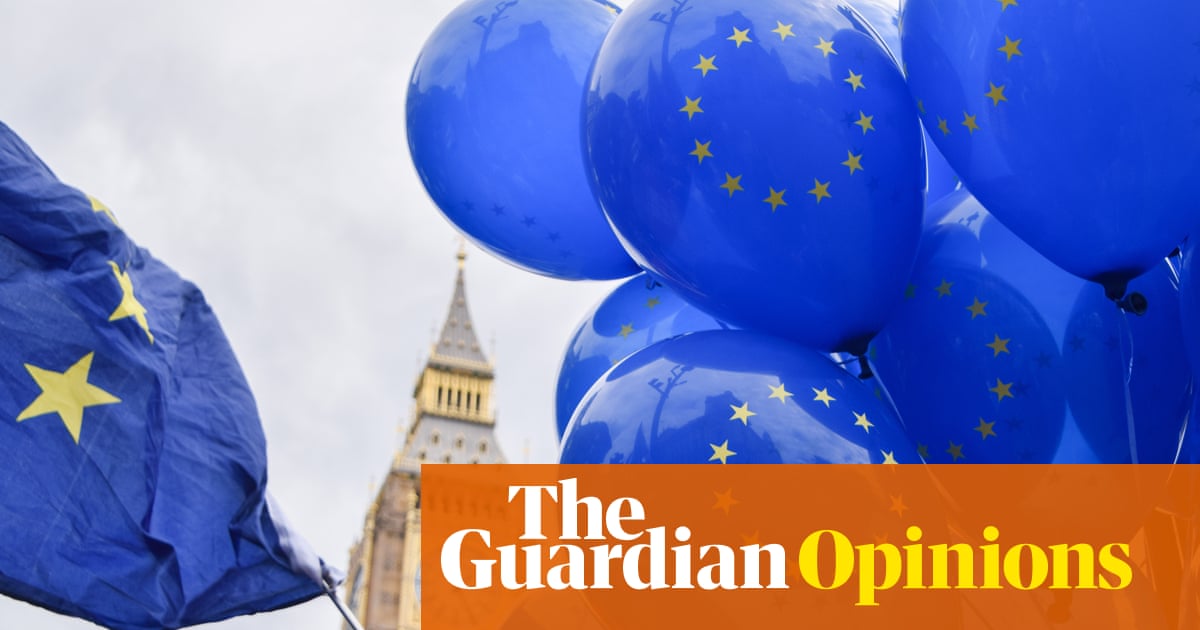It’s nearly nine years now since Britainlost its collective mind.
More than enough time, then, to put the Brexit referendum into perspective. Leavers have moved on to the point where only 11%of British votersstill kid themselvesthat it’s turned out brilliantly. It’s remain politicians who had started to look strangely stuck in the past, still frightened of sounding too pro-European in case they somehow woke the monster. But joyfully – now there’s a word I haven’t typed much lately – it looks like something is finally shifting.
A youth visa deal with the EU, giving 18- to 30-year-olds a chance towork or study abroadin member states for at least a year, is now on the table after months of ministers furiously insisting it wouldn’t be. It’s not the return of freedom of movement, but it’s the least gen Z deserve: a chance for the kids whose horizons were sowretchedly shrunk by Covidto broaden them and have a few adventures, instead of staying home hunched over their phones. How miserable do you have to be to deny them that?
And even for the over-30s it’s strangely exhilarating to hear something other than a terrified, clenched-buttock “no” to any vaguely pro-European proposal, just as it’s a relief to hear Rachel Reeves publicly acknowledge that a good “reset” deal with the EU in May ispotentially biggerthan a trade deal with the US (though for a British car industryfacing a 25% Trump tariff, of course the latter matters).
What’s changed? An intriguing new deep dive into Labour leavers’ and Labour-to-Reform switchers’ attitudes to Europe, published this week by theGood Growth Foundationthinktank, underlines both why Labour has been so cautious for so long and why it may now be getting slightly bolder.
First the bad news: perhaps partlybecausesome now feel they were conned over Brexit,Labourleavers remain very wary of being fooled again. Though most now see the EU as more trustworthy allies than Trump’s US, that confidence is easily knocked: support for a rapprochement with Europe drops quickly when focus groups are shown the kind of rightwing attack messages – charges of surrender and sellout – that would inevitably follow. They still tend to want the good bits of a deal (cheaper energy, lower food prices) without giving much up in return.
But if they’re only slowly warming to Europe, they are clear-eyed about the alternatives: Trump’s US and Putin’s Russia are both seen as greater threats to British interests than terrorism. The most compelling case for a “reset”, according to the Good Growth Foundation’s director Praful Nargund, is therefore not an economic one about closer trade links making us better off – though we would be – but an emotional one about security. In a dangerous world, you huddle closer together, burying past differences. Surprisingly for anyone whoremembers the daysof frothing outrage over a“common EU army”, 47% of Labour leave voters now want “a lot of” cooperation with the EU on defence and security (though they’ll also want to see the British defence industry get access to a new EU fundestablished for re-arming Europe, to help create defence jobs back home).
In this new climate of willingness to work with people we trust, a youth mobility deal could be acceptable if numbers were capped and travellers didn’t get free access to services such as the NHS, the Foundation concludes. And though a quarter of Labour-to-Reform switchers still don’t want the European court of justice having powers to enforce any new deal, there are potential fudges around that. If anything, the biggest red line turns out to be granting EU trawlers greater access to our waters, which is puzzling given how tiny the British fishing industry now is. But unpicking that in focus groups, it turns out that what people most fear is losing control. It’s not really about fish but about a sense of keeping what’s ours, not being pushed around. They need to see practical benefits from any EU deal but they also need what they didn’t get from the 2016 remain campaign, which is an understanding of the gut emotionsEuropeevokes and what it symbolises to them. Pitch it right, and there’s a deal to be done.
Will Labour’s courage falter at the last minuteif Reform sweeps the boardin this Thursday’s local elections? Maybe, but the price ofnotbeing braver is also becoming clearer. Aseparate analysisthis week from the research group Persuasion UK of where Labour’s now crumbling 2024 vote has gone finds they’re flaking away faster from the left than the right. Even in “red wall” seats, Labour waverers are now three times more likely to switch to the Liberal Democrats and twice as likely to move to the Greens – bothmore explicitly pro-Europeanparties – than to Reform.
A deal to let young Europeans travel, plus a bit of realism about a Trump trade deal, isn’t exactly the dramatic pivot back to Europe that some have longed to see. It certainly won’t be enough for militant rejoiners. But remain voters tend to be pragmatic by nature – it’s why we voted remain, for heaven’s sake – and even these baby steps beat years of Labourjumping nervouslyat its own shadow. Like the spring sunshine, maybe this unexpected warmth towards our neighbours won’t last. But if there’s one thing to be learned from living on a cold, rainy island, it’s to enjoy the sun while you can.
Gaby Hinsliff is a Guardian columnist
